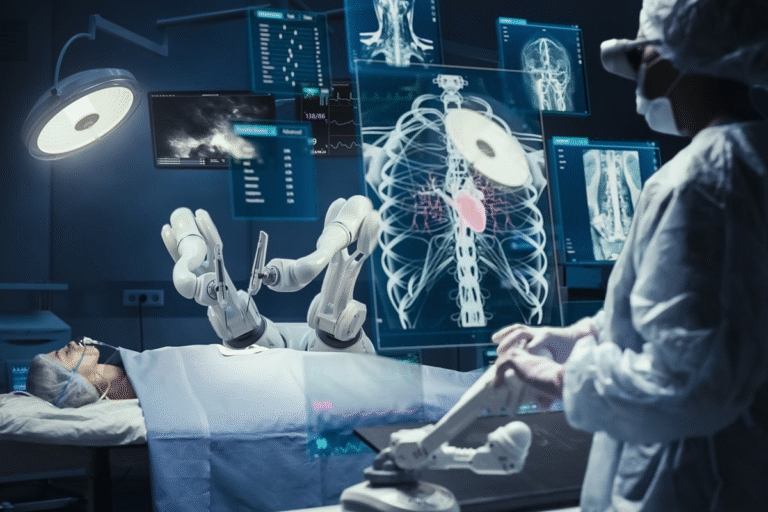Future of Advanced Robotics in Healthcare and Surgery
The world of healthcare is changing rapidly, and one of the most exciting advancements is the use of advanced robotics in healthcare and surgery. These intelligent machines are transforming the way doctors diagnose, treat, and care for patients. From assisting in delicate surgeries to improving recovery times, robotics is paving the way for a new era in medicine.
In this article, we will explore the future of advanced robotics in healthcare and surgery, highlighting the benefits, challenges, and what patients can expect in the coming years.
What Are Advanced Robotics in Healthcare?
Advanced robotics refers to highly sophisticated machines designed to perform tasks with precision, speed, and consistency that sometimes exceed human abilities. In healthcare, these robots assist medical professionals in tasks such as surgery, patient care, diagnostics, and rehabilitation.
Robots in surgery, for example, are not autonomous but work alongside surgeons. They provide enhanced precision, minimize human error, and allow for minimally invasive procedures.
How Are Robotics Changing Surgery Today?
Robotic surgery is already a reality in many hospitals worldwide. Systems like the Da Vinci Surgical System have been used for years to perform complex operations through tiny incisions, reducing patient trauma and speeding up recovery.
Benefits of robotic surgery include:
- Precision: Robots can make very precise movements that are difficult for human hands.
- Minimally Invasive: Smaller incisions mean less pain, fewer infections, and faster healing.
- Enhanced Vision: Surgeons get a 3D, high-definition view of the surgical area.
- Reduced Fatigue: Robots handle repetitive or difficult motions, reducing surgeon fatigue.
The Future of Robotics in Healthcare
The future promises even more incredible advancements as technology evolves. Here’s what to expect:
- More Autonomous Robots: While current robots assist surgeons, future robots will have greater autonomy. They could perform specific surgical tasks independently under supervision, increasing efficiency and safety.
- Artificial Intelligence Integration: AI will help robots analyze patient data in real-time during surgery, providing suggestions and alerts to improve outcomes.
- Remote Surgery: Surgeons could operate robots remotely, allowing patients in rural or underserved areas to access expert surgical care without traveling.
- Personalized Treatment: Robots combined with AI could tailor treatments to individual patients by analyzing their unique genetics and health data.
- Improved Rehabilitation Robots: Post-surgery, advanced robots will help patients recover faster through personalized physical therapy exercises guided by real-time monitoring.
Robotics Beyond Surgery: Healthcare Applications
Robots in healthcare aren’t just for surgery. They are becoming valuable in other areas too:
- Diagnostics: Robots with AI can analyze medical images and data to detect diseases early.
- Patient Care: Robots can assist nurses by monitoring vital signs and administering medication.
- Elder Care: Robots can support elderly patients with mobility, reminders, and companionship.
- Laboratory Automation: Robots speed up the testing of samples, increasing accuracy and throughput.
Challenges to Overcome
While the future looks bright, several challenges remain:
- Cost: Advanced robotic systems are expensive to develop, buy, and maintain.
- Training: Healthcare providers need special training to operate and trust these systems.
- Ethical Concerns: Decisions made by autonomous robots raise ethical questions about responsibility.
- Data Privacy: AI systems require access to patient data, creating concerns about privacy and security.
- Technical Limitations: Robotics technology must continue to improve in flexibility, responsiveness, and safety.
The Patient Experience: What Does This Mean for You?
For patients, the rise of robotics in healthcare means safer, faster, and more personalized treatments. Surgeries that once required large cuts and long hospital stays could soon be done with tiny incisions and quick recoveries. Remote robotic surgery might make it easier to get expert care no matter where you live.
Additionally, robots will help monitor your health continuously, catching problems before symptoms appear, and guiding your recovery after treatment.
Conclusion
The future of advanced robotics in healthcare and surgery is full of promise. These machines will enhance human abilities, improve patient outcomes, and make healthcare more accessible worldwide. While challenges exist, ongoing innovation, ethical guidelines, and proper training will help unlock the full potential of robotics in medicine.
As we look ahead, it’s clear that robotics will play a crucial role in shaping a smarter, safer, and more compassionate healthcare system for everyone.
FAQs About Advanced Robotics in Healthcare and Surgery
1. Are robotic surgeries safer than traditional surgeries?
Robotic surgeries often reduce risks such as infection and blood loss due to smaller incisions and greater precision. However, the safety depends on the surgeon’s skill and the procedure type.
2. Will robots replace doctors and surgeons?
No, robots are designed to assist medical professionals, not replace them. The expertise, decision-making, and compassion of healthcare providers remain essential.
3. How soon will remote robotic surgeries become common?
Remote surgery is already being tested, but widespread adoption depends on technology improvements, infrastructure, and regulatory approval. It may take several years.
4. Can robots handle emergency surgeries?
Currently, robots assist in planned surgeries rather than emergencies. Future advancements may enable robotic support in emergency settings.5. How much do robotic surgery systems cost?
Robotic systems can cost millions of dollars, which limits their availability to larger medical centers. Over time, costs may decrease as technology matures.


